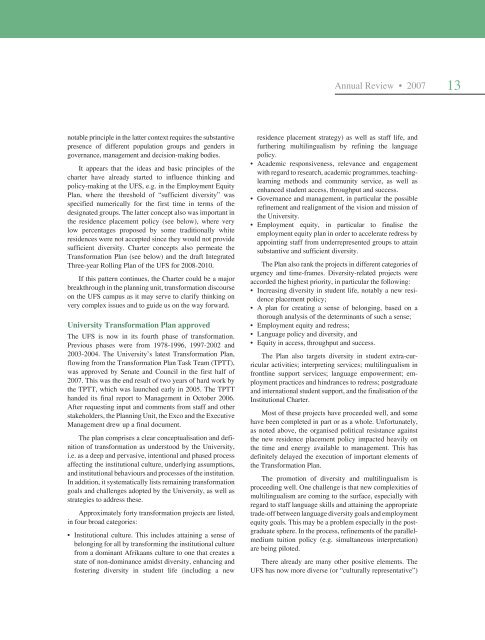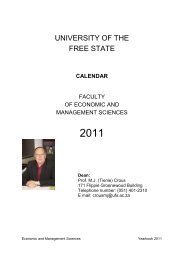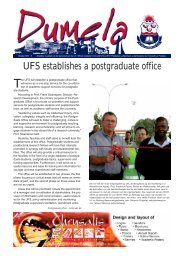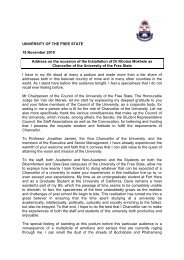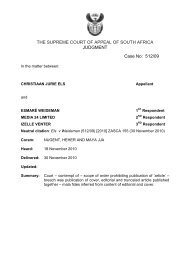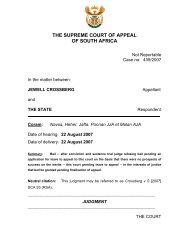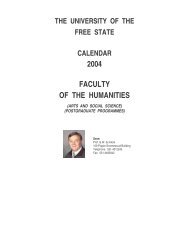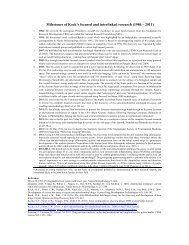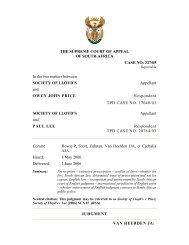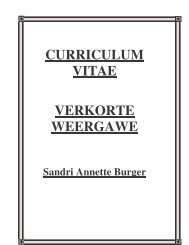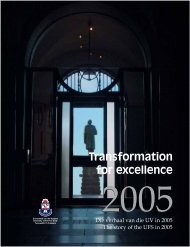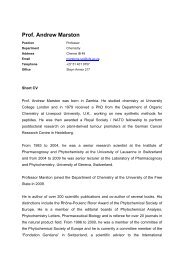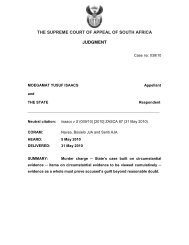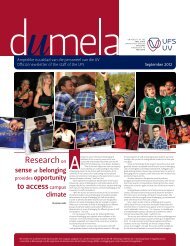UV Jaaroorsig - University of the Free State
UV Jaaroorsig - University of the Free State
UV Jaaroorsig - University of the Free State
Create successful ePaper yourself
Turn your PDF publications into a flip-book with our unique Google optimized e-Paper software.
notable principle in <strong>the</strong> latter context requires <strong>the</strong> sub stantive<br />
presence <strong>of</strong> different population groups and gen ders in<br />
governance, management and decision-making bodies.<br />
It appears that <strong>the</strong> ideas and basic principles <strong>of</strong> <strong>the</strong><br />
charter have already started to influence thinking and<br />
policy-making at <strong>the</strong> UFS, e.g. in <strong>the</strong> Employment Equity<br />
Plan, where <strong>the</strong> threshold <strong>of</strong> “sufficient diversity” was<br />
specified numerically for <strong>the</strong> first time in terms <strong>of</strong> <strong>the</strong><br />
designated groups. The latter concept also was important in<br />
<strong>the</strong> residence placement policy (see below), where very<br />
low percentages proposed by some traditionally white<br />
residences were not accepted since <strong>the</strong>y would not provide<br />
sufficient diversity. Charter concepts also permeate <strong>the</strong><br />
Transformation Plan (see below) and <strong>the</strong> draft Integrated<br />
Three-year Rolling Plan <strong>of</strong> <strong>the</strong> UFS for 2008-2010.<br />
If this pattern continues, <strong>the</strong> Charter could be a major<br />
breakthrough in <strong>the</strong> planning unit, transformation discourse<br />
on <strong>the</strong> UFS campus as it may serve to clarify thinking on<br />
very complex issues and to guide us on <strong>the</strong> way forward.<br />
<strong>University</strong> Transformation Plan approved<br />
The UFS is now in its fourth phase <strong>of</strong> transformation.<br />
Previous phases were from 1978-1996, 1997-2002 and<br />
2003-2004. The <strong>University</strong>’s latest Transformation Plan,<br />
flowing from <strong>the</strong> Transformation Plan Task Team (TPTT),<br />
was approved by Senate and Council in <strong>the</strong> first half <strong>of</strong><br />
2007. This was <strong>the</strong> end result <strong>of</strong> two years <strong>of</strong> hard work by<br />
<strong>the</strong> TPTT, which was launched early in 2005. The TPTT<br />
handed its final report to Management in October 2006.<br />
After requesting input and comments from staff and o<strong>the</strong>r<br />
stakeholders, <strong>the</strong> Planning Unit, <strong>the</strong> Exco and <strong>the</strong> Executive<br />
Management drew up a final document.<br />
The plan comprises a clear conceptualisation and de finition<br />
<strong>of</strong> transformation as understood by <strong>the</strong> <strong>University</strong>,<br />
i.e. as a deep and pervasive, intentional and phased process<br />
affecting <strong>the</strong> institutional culture, underlying assumptions,<br />
and institutional behaviours and processes <strong>of</strong> <strong>the</strong> institution.<br />
In addition, it systematically lists remaining transformation<br />
goals and challenges adopted by <strong>the</strong> <strong>University</strong>, as well as<br />
strategies to address <strong>the</strong>se.<br />
Approximately forty transformation projects are listed,<br />
in four broad categories:<br />
• Institutional culture. This includes attaining a sense <strong>of</strong><br />
belonging for all by transforming <strong>the</strong> institutional culture<br />
from a dominant Afrikaans culture to one that creates a<br />
state <strong>of</strong> non-dominance amidst diversity, enhancing and<br />
fostering diversity in student life (including a new<br />
Annual Review • 2007 13<br />
residence placement strategy) as well as staff life, and<br />
fur<strong>the</strong>ring multilingualism by refining <strong>the</strong> language<br />
policy.<br />
• Academic responsiveness, relevance and engagement<br />
with regard to research, academic programmes, teachinglearning<br />
methods and community service, as well as<br />
enhanced student access, throughput and success.<br />
• Governance and management, in particular <strong>the</strong> possible<br />
refinement and realignment <strong>of</strong> <strong>the</strong> vision and mission <strong>of</strong><br />
<strong>the</strong> <strong>University</strong>.<br />
• Employment equity, in particular to finalise <strong>the</strong><br />
employment equity plan in order to accelerate redress by<br />
appointing staff from underrepresented groups to attain<br />
substantive and sufficient diversity.<br />
The Plan also rank <strong>the</strong> projects in different catego ries <strong>of</strong><br />
urgency and time-frames. Diversity-related projects were<br />
accorded <strong>the</strong> highest priority, in particular <strong>the</strong> following:<br />
• Increasing diversity in student life, notably a new residence<br />
placement policy;<br />
• A plan for creating a sense <strong>of</strong> belonging, based on a<br />
thorough analysis <strong>of</strong> <strong>the</strong> determinants <strong>of</strong> such a sense;<br />
• Employment equity and redress;<br />
• Language policy and diversity, and<br />
• Equity in access, throughput and success.<br />
The Plan also targets diversity in student extra-curricular<br />
activities; interpreting services; multilingualism in<br />
front line support services; language empowerment; employment<br />
practices and hindrances to redress; postgraduate<br />
and international student support, and <strong>the</strong> finalisation <strong>of</strong> <strong>the</strong><br />
Institutional Charter.<br />
Most <strong>of</strong> <strong>the</strong>se projects have proceeded well, and some<br />
have been completed in part or as a whole. Unfortunately,<br />
as noted above, <strong>the</strong> organised political resistance against<br />
<strong>the</strong> new residence placement policy impacted heavily on<br />
<strong>the</strong> time and energy available to management. This has<br />
definitely delayed <strong>the</strong> execution <strong>of</strong> important elements <strong>of</strong><br />
<strong>the</strong> Transformation Plan.<br />
The promotion <strong>of</strong> diversity and multilingualism is<br />
proceeding well. One challenge is that new complexities <strong>of</strong><br />
multilingualism are coming to <strong>the</strong> surface, especially with<br />
regard to staff language skills and attaining <strong>the</strong> ap pro pri ate<br />
trade-<strong>of</strong>f between language diversity goals and employment<br />
equity goals. This may be a problem especially in <strong>the</strong> postgraduate<br />
sphere. In <strong>the</strong> process, refinements <strong>of</strong> <strong>the</strong> parallelmedium<br />
tuition policy (e.g. simultaneous interpretation)<br />
are being piloted.<br />
There already are many o<strong>the</strong>r positive elements. The<br />
UFS has now more diverse (or “culturally representative”)


